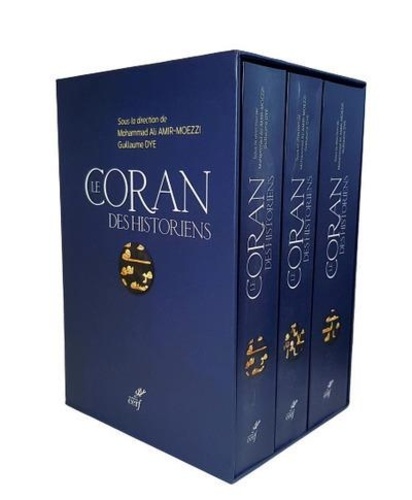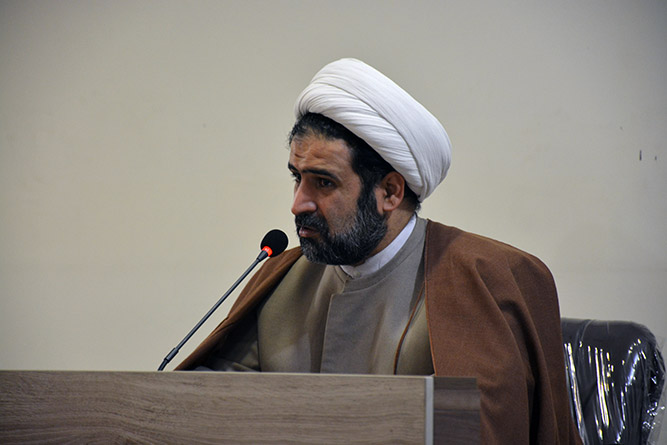Why is the book “Quran of Historians” important?
“This work presents the unspoken and unheard angles of study of some Western scholars in the history of the Quran and its context, which can provide the ground for new research in the heart of the study and Quranic centers of Islamic countries,” wrote the president of AhlulBayt (a.s.) University in an article about the book “Quran of Historians”.
The 3-volume collection “The Quran of Historians” (original name: Le Coran des Historiens) by 30 scholars of the history of religions, under the supervision of “Muhammad Ali AmirMoezi” Professor at Applied School of Higher Studies (EPHE) and “Guillaume Dye” Professor of Islamic studies published by the University of Brussels.

In the 1st volume of this collection, the content and origin of the text of the Qur'an are examined. In the 2nd volume, the interpretation and analysis of 144 chapters of the Quran are presented, and the 3rd volume presents the bibliography of Quranic studies.
This collection was released to the book market in November 2019 by CERF Publication in French and 4372 pages.
Regarding the status and importance of this book, the President of AhlulBayt (a.s.) University and a member of the Laboratory of Religious Studies of the Sorbonne School of Practical Studies, Hojat al-Islam Dr. “Saeed Jazari Mamoui” wrote the following article:

Why is the book “Quran of Historians” important?
By: Saeed Jazari Mamoui
February 26, 2021
This work presents the unspoken and unheard angles of study of some Western scholars in the history of the Quran and its context, which can provide the ground for new research in the heart of the study and Quranic centers of Islamic countries.
“The Quran of Historians” is an important and academic work in the field of Quranic studies, which is written over a period of more than five years in France and was published in November last year at CERF Publication in Paris under the supervision of Professor “Mohammad Ali Amir Moezi”, a Shiite scholar and prominent professor at the Sorbonne University of France (School of Practical Studies) and in collaboration with Guillaume dye (University of Brussels) and a group of Prominent Western professors and researchers.
This book is in fact a kind of historical-analytical encyclopedia on the subject of the Quran, the course of revelation, the opinions of historians, and various related hypotheses. Written in three thick volumes of more than 4,000 pages, this book, while introducing and translating verse by verse of the Quran and expressing interpretive points taken from the opinions of famous Muslim commentators and Western thinkers, has analyzed it from a critical and historical perspectives.
This book is valuable for scholars in Quranic studies from several perspectives:
1. Amir Moazi and his group have been able to use their critical and analytical study methods to present most of the popular interpretive ideas along with the reflections of Orientalists and Quranologists in an independent collection with popular literature in Western universities. This has never been done before in any of the Western academic and research institutes on this scale.
2. This work presents the unspoken and unheard study angles of some Western scholars in the history of the Quran and its textology, which can provide the ground for new research in the study and Quranic centers of Islamic countries. In other words, certainly, this style and context of critical-analytical studies can create its hypotheses as to the title of new research for researchers in the Islamic world.
Although some Western theories may not be compatible with traditional Islamic theological texts at first glance, the existence and design of these hypotheses can help in enriching and fertilizing analytical ideas in the field of Quranic studies.
Although the style of critical and analytical studies in traditional and hadith texts is not yet as widespread as it should be and traditional currents in Islamic countries are not fully associated with it, but the neglect of Muslim scholars in this type of research is also not acceptable.
Understanding the thoughts of others while studying their works can provide new and valuable resources in the field of Islam in the general sense. It seems that this type of study has and will have an undeniable effect on the evolution of ijtihad methods.
3. This great academic work can be a valuable resource even for non-experts in Quranic studies in understanding the type of view and studies of Westerners of Islam. However, it seems unlikely that a Persian or Arabic translation of this academic work would be available soon.
4. Bibliography of studies and works of Quranic studies is also an important chapter of this academic work that will definitely be of great importance for researchers in this field.
In the end, it should be mentioned that this important work has been compiled with the academic management and valuable efforts of Professor Amir Moezi in the secular study-academic environment of France. That is its course of study is independent of religious thought or opposition to religion. The academic and research system in France, based on the principle of “neutrality in research and education”, causes Muslim and non-Muslim scholars to refrain from expressing their views in favor or against religion in this precious work. Of course, this does not mean denying the writers’ inner perceptions. But in any case, this kind of research perspective does not decrease the value of the work, and its greatness and scope will certainly be obvious to researchers.
“This work presents the unspoken and unheard angles of study of some Western scholars in the history of the Quran and its context, which can provide the ground for new research in the heart of the study and Quranic centers of Islamic countries,” wrote the president of AhlulBayt (a.s.) University in an article about the book “Quran of Historians”.
The 3-volume collection “The Quran of Historians” (original name: Le Coran des Historiens) by 30 scholars of the history of religions, under the supervision of “Muhammad Ali AmirMoezi” Professor at Applied School of Higher Studies (EPHE) and “Guillaume Dye” Professor of Islamic studies published by the University of Brussels.

In the 1st volume of this collection, the content and origin of the text of the Qur'an are examined. In the 2nd volume, the interpretation and analysis of 144 chapters of the Quran are presented, and the 3rd volume presents the bibliography of Quranic studies.
This collection was released to the book market in November 2019 by CERF Publication in French and 4372 pages.
Regarding the status and importance of this book, the President of AhlulBayt (a.s.) University and a member of the Laboratory of Religious Studies of the Sorbonne School of Practical Studies, Hojat al-Islam Dr. “Saeed Jazari Mamoui” wrote the following article:

Why is the book “Quran of Historians” important?
By: Saeed Jazari Mamoui
February 26, 2021
This work presents the unspoken and unheard angles of study of some Western scholars in the history of the Quran and its context, which can provide the ground for new research in the heart of the study and Quranic centers of Islamic countries.
“The Quran of Historians” is an important and academic work in the field of Quranic studies, which is written over a period of more than five years in France and was published in November last year at CERF Publication in Paris under the supervision of Professor “Mohammad Ali Amir Moezi”, a Shiite scholar and prominent professor at the Sorbonne University of France (School of Practical Studies) and in collaboration with Guillaume dye (University of Brussels) and a group of Prominent Western professors and researchers.
This book is in fact a kind of historical-analytical encyclopedia on the subject of the Quran, the course of revelation, the opinions of historians, and various related hypotheses. Written in three thick volumes of more than 4,000 pages, this book, while introducing and translating verse by verse of the Quran and expressing interpretive points taken from the opinions of famous Muslim commentators and Western thinkers, has analyzed it from a critical and historical perspectives.
This book is valuable for scholars in Quranic studies from several perspectives:
1. Amir Moazi and his group have been able to use their critical and analytical study methods to present most of the popular interpretive ideas along with the reflections of Orientalists and Quranologists in an independent collection with popular literature in Western universities. This has never been done before in any of the Western academic and research institutes on this scale.
2. This work presents the unspoken and unheard study angles of some Western scholars in the history of the Quran and its textology, which can provide the ground for new research in the study and Quranic centers of Islamic countries. In other words, certainly, this style and context of critical-analytical studies can create its hypotheses as to the title of new research for researchers in the Islamic world.
Although some Western theories may not be compatible with traditional Islamic theological texts at first glance, the existence and design of these hypotheses can help in enriching and fertilizing analytical ideas in the field of Quranic studies.
Although the style of critical and analytical studies in traditional and hadith texts is not yet as widespread as it should be and traditional currents in Islamic countries are not fully associated with it, but the neglect of Muslim scholars in this type of research is also not acceptable.
Understanding the thoughts of others while studying their works can provide new and valuable resources in the field of Islam in the general sense. It seems that this type of study has and will have an undeniable effect on the evolution of ijtihad methods.
3. This great academic work can be a valuable resource even for non-experts in Quranic studies in understanding the type of view and studies of Westerners of Islam. However, it seems unlikely that a Persian or Arabic translation of this academic work would be available soon.
4. Bibliography of studies and works of Quranic studies is also an important chapter of this academic work that will definitely be of great importance for researchers in this field.
In the end, it should be mentioned that this important work has been compiled with the academic management and valuable efforts of Professor Amir Moezi in the secular study-academic environment of France. That is its course of study is independent of religious thought or opposition to religion. The academic and research system in France, based on the principle of “neutrality in research and education”, causes Muslim and non-Muslim scholars to refrain from expressing their views in favor or against religion in this precious work. Of course, this does not mean denying the writers’ inner perceptions. But in any case, this kind of research perspective does not decrease the value of the work, and its greatness and scope will certainly be obvious to researchers.





